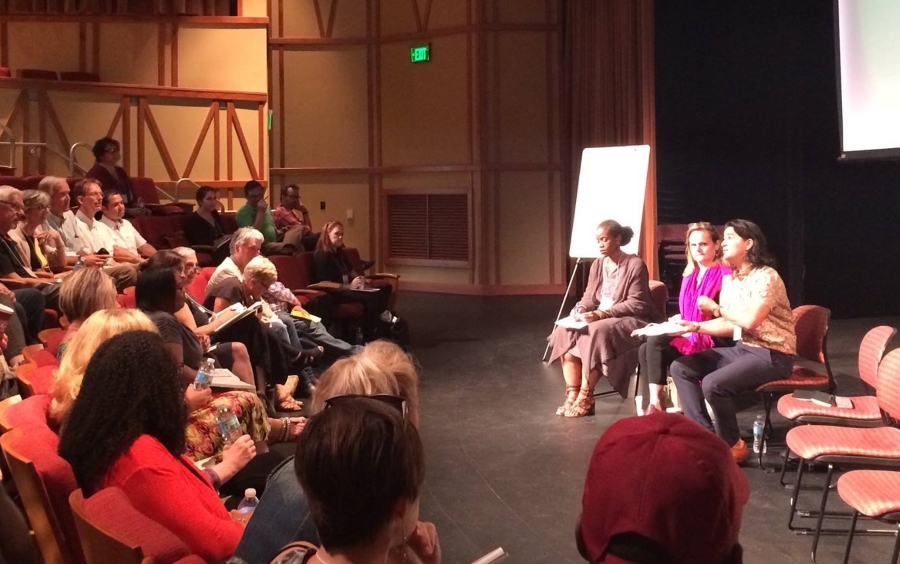Earlier in the lively summer currently winding down, I was invited to speak at the North Carolina Theatre Conference’s annual Producing Gathering, held this year at North Carolina State University in Raleigh. Thanks to Angie Hays, NCTC’s intrepid leader, this was the second such gathering I’ve keynoted, and returning this summer gave me a chance to take stock of what’s changed in the five years since my first meeting with these theatre practitioners in 2011. In many ways, the times couldn’t be more different.
What distinguishes North Carolina’s theatre ecology is its breadth of structure, from large community theatres such as Theatre Charlotte and Raleigh Little Theatre, which are professionally staffed behind the scenes; to fully professional Equity companies such as Triad Stage, Burning Coal, and PlayMakers Repertory Company; to large outdoor perennials such as Paul Green’s The Lost Colony, which started way back in 1937. NCTC embraces all these and goes beyond, offering programs for high school and college theatre aspirants as well.
In 2011, the economic recovery post-2008 was front and center. At Triad Stage in Greensboro, I presented highlights from Theatre Facts, TCG’s annual survey of the field. Joseph Haj, then artistic director of Chapel Hill’s PlayMakers Rep and a TCG board member, interviewed me on national trends and dynamics, and attendees were treated to a skills-building session about the social media revolution given by NCTC staffer Shane Hudson, addressing such questions as, How might Facebook be tapped to promote plays? And how many daily tweets were needed to score a truckload of followers?
There were also whispers of concern then about the potential impact of North Carolina’s 2010 elections, in which the state assembly went from 98 Democrats and 72 Republicans to 71 Democrats, 98 Republicans, and 1 independent—the first time the body had been Republican-dominated in nearly 150 years. What that might mean for the longstanding “moderate consensus”? It was too soon to tell.
Now, five years later, Haj is artistic director of Minneapolis’s Guthrie Theater, and Hudson is executive director of New York City’s Primary Stages. Triad Stage has added a new theatre in Winston-Salem, N.C. And the impact of the state legislature’s turnover is unmistakable.
My decision to return to North Carolina this year occurred many months prior to the enactment of the Public Facilities Privacy and Security Act (HB2), which limits people to using only restroom facilities that match the biological sex on their birth certificate. Since it was passed in March, HB2 has caused anguish for transgender and gender-nonconforming individuals, and has led to protests, legal challenges—and, unfortunately, similar bills being enacted in other states.
While big businesses, big celebrities, and a few well-known theatre artists have boycotted the state, we decided not to. We knew that our absence wouldn’t be noticed by current Gov. Pat McCrory or the state assembly, but it would be felt by our theatre family in North Carolina—those on the ground trying to find ways to respond to a state government that is using its powers to strip civil liberties and devolve priorities favoring quality of life and infrastructure for the public good.
At the Producing Gathering, we had the opportunity—along with Carmen Morgan, Ty Defoe, and artEquity—to focus on matters of fairness, diversity, and inclusion in our theatre systems locally, nationally, and globally. There were rich conversations and a strong desire to continue the learning. I also visited and spoke with the Raleigh Arts Commission about TCG’s work in the area of equity, diversity, and inclusion, and to hear about some of the council’s goals.
In debriefs with North Carolinians, and from an impressive special issue of Raleigh’s Indy Week devoted to HB2, we also learned much about how the law came about, the pain it has caused, and ways in which it’s being replicated in other states.
In his informative article “The 30 Years that Brought Us HB2,” journalist Barry Yeoman describes three dynamics that made the bill possible: the decades-long practice of “preemption”; the well-funded national GOP effort to assert state Republican control of North Carolina in 2010; and the subsequent dismantling of the state’s moderate consensus, along with the increasing visibility of transgender communities.
All of these dynamics are worth further examination, but preemption in particular is something to track. Regional minimum wage and working conditions, antidiscrimination, anti-fracking, gun control, plastic bag bans, and, yes, bathroom use have all been targeted through preemption strategies in various states. In the case of North Carolina, that process started in February when the Charlotte City Council passed a nondiscrimination ordinance that included, among other things, sexual orientation and gender identity. The state General Assembly quickly went to work, preempting the ordinance with a bill that shut down local antidiscrimination laws and added laws dealing with public bathroom facilities.
In this election year, all eyes are on what might happen federally, depending upon who is elected. But there’s also much to watch out for in state contests, along with the challenge to our theatre community about how to respond when laws such as HB2 pass. Is boycotting the right response? Maybe not—or maybe not always. In these complicated and fraught times, it’s worth examining how we, as a theatre nation, can join forces to make a difference that is strategic and responsive to what our communities need from all of us.
*Due to an editing error, an earlier version of this piece incorrectly stated that this year’s North Carolina trip took place before the enactment of HB2. The decision to go, not the visit itself, occurred months prior to the law’s adoption.


